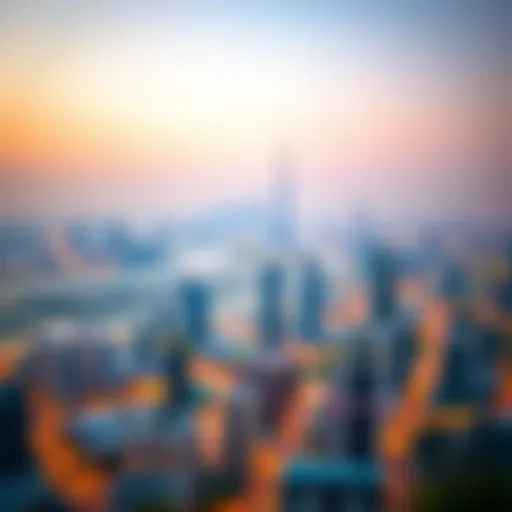Discovering Dubai's Souks: Culture and Commerce
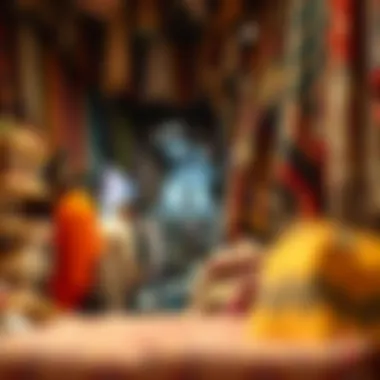
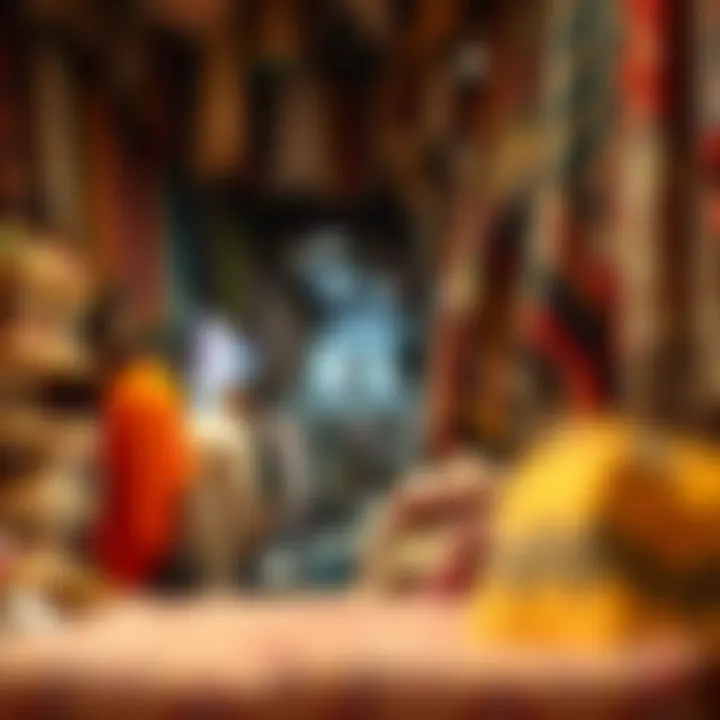
Intro
Dubai, a city that is always in the spotlight, is renowned for its extravagant skyline and modern wonders. However, there lies another side to this glitzy metropolis—a realm where the air is thick with spices, fabrics, and the sounds of merchants keenly engaging in trade. The souks of Dubai serve as a vibrant reminder of the city’s rich history and cultural tapestry, echoing the age-old trading routes once traveled by merchants long before the advent of skyscrapers. In exploring these traditional markets, we embark on a journey that reveals how they not only shape the cultural landscape of this dynamic city but also hold significant economic weight as part of the rapidly evolving real estate scene.
With each souk having its distinct character, from the aromatic Dubai Spice Souk to the lavish Gold Souk, these local marketplaces offer an immersive experience that showcases the essence of Dubai. They act as both cultural hubs and economic engines, contributing to the local economy while offering unique opportunities for investors and buyers alike.
In this article, we will peel back the layers of these captivating markets, uncovering their historical significance and modern-day relevance. We will also delve into how these souks impact Dubai’s real estate landscape, making it essential reading for investors, homeowners, and anyone keen on understanding the fabric of this remarkable city. As we venture into the depths of Dubai’s souks, the interplay of tradition and innovation will present itself, inviting both locals and visitors to partake in a journey where commerce and culture intertwine seamlessly.
Prolusion to Dubai's Souks
Dubai's souks, with their lively atmospheres and distinct charm, are more than just places to shop; they are the lifeblood of the city’s culture and economy. With roots deep in tradition, these markets serve as a vibrant reminder of the past while also marrying modern commerce. For anyone looking to understand the nuances of Dubai, from its rich heritage to its bustling economy, the souks hold a wealth of knowledge.
Definition and Purpose
The souks of Dubai are traditional marketplaces where various goods are bought and sold. They differ from modern shopping malls in that they are not just commercial spaces; they are cultural hubs. Each souk specializes in a particular type of merchandise, such as spices, textiles, or gold. The purpose of these markets goes beyond simple transactions. They act as meeting points facilitating social interactions and preserving age-old traditions. The very act of haggling, for instance, is not merely about saving a few dirhams but also about engaging with the local culture. Visitors often leave not just with unique purchases, but also with stories and memories that bind them to this vibrant city.
Historical Overview
The history of Dubai’s souks is a tale woven into the fabric of the city itself. Emerging in the early 20th century, they played a crucial role as trade centers along the routes connecting Europe, Asia, and Africa. In those early days, Dubai was a modest fishing village, and the souks were vital in establishing its role as a trade hub. The gold trade, for example, has flourished for centuries—an echo of Dubai’s initial economic foundations.
As time marched on, the souks adapted to changes, yet they maintained the essence of their historical significance. While skyscrapers and luxury resorts now dot the skyline, the souks stand as a testament to the city’s ability to blend tradition with modernity. Even for those who may not spend much, the simple act of wandering through narrow alleyways filled with aromas, sounds, and colors is an experience that many seek.
Cultural Significance of Souks
The souks of Dubai hold more than just an economic function; they embody a rich tapestry of culture and societal interaction. Each vibrant marketplace is bustling with life, representing not only a trading post but a crucial focal point where tradition and contemporary dynamics collide. For investors and community members alike, understanding the cultural significance of these souks provides a clearer view of how they influence local identity and contribute to the broader narrative of Dubai's development.
Tradition and Community
When one strolls through the winding corridors of a souk, there’s a palpable sense of history wrapped in the scents of spices and sounds of haggling. The tradition of souks in Dubai goes far back, serving as the very nucleus of trade and commerce in the region. Here, age-old practices coexist with modern enterprise, where generations of families have participated as both merchants and customers. In places like the Gold Souk, the exchange goes beyond mere currency; it’s about heritage. Merchants often pass down business practices, such as celebrating customer relationships and adhering to principles of honor in trade.
The community aspect cannot be understated. Souks are not merely shopping venues; they are venues for social gatherings, cultural exchanges, and the sharing of stories and experiences. During festivals, souks come to life, bursting with festive lights and local cultural displays, inviting not only loyal customers but also tourists eager to learn about Emirati customs.
"Souks, in essence, are living museums of tradition, thriving under the weight of modernity."
Furthermore, these markets often serve as the backbone of community support. Small business all over Dubai rely on the foot traffic that souks provide, thus empowering local artisans and supporting familial incomes. The interpersonal connections made here often evolve into lifelong friendships, further strengthening the bonds within the community. Visitors who delve into these markets find them teeming with not just goods but stories, culture, and warmth, making entrepreneurship a holistic experience that transcends the transactional.
Role in Social Networking
In today's fast-paced world, the souks of Dubai remain an essential hub for social networking. They provide a unique environment where business deals can be struck over a cup of Arabic coffee, and friendly banter often leads to negotiations that would take a more formal setting much longer. Here, the act of shopping transforms into a social event, emphasizing the value of relationships over mere profit.
For aspiring entrepreneurs, having a presence in the souks can open doors to a myriad of connections. Many successful businesspeople recount how their initial contacts were made while chatting with vendors or admiring hand-crafted goods on display. This informal atmosphere fosters discussions that might not happen in the sterile spaces of modern shopping malls.
The variety of goods available—from intricate textiles to exotic spices—can also serve as conversation starters, drawing people together who might otherwise never meet. Moreover, specialized souks attract niche audiences, providing opportunities for those looking to network within specific industries. So, whether it’s sharing insights into the latest design trends at the Textile Souk or discussing culinary secrets at the Spice Souk, the cultural landscape is rich with networking possibilities.
In summary, the cultural significance of Dubai's souks is multi-faceted. They are the living embodiments of tradition, collaboration, and community spirit, serving not just as markets, but as essential social platforms that forge connections and relationships in ways that can't be replicated through digital means. Understanding this cultural backdrop is vital for anyone looking to invest or participate in the dynamics of this ever-evolving city.
Types of Souks in Dubai
Dubai's souks are a compelling testament to its rich heritage, and understanding the different types significant to the culture and economy of the region is crucial. From dazzling gold to fragrant spices, each souk brings a unique flavor, appealing not just to tourists but also holding immense value for investors, homeowners, and artisans alike. These markets are more than mere shopping destinations; they represent historical narratives, cultural exchanges, and entrepreneurial ventures that define Dubai's identity. Each type of souk offers distinct merchandise, experiences, and opportunities for business, fostering a connection between tradition and the modern market.
Gold Souk
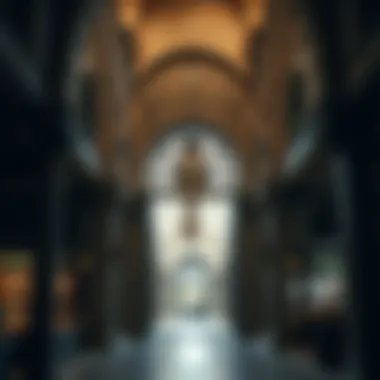
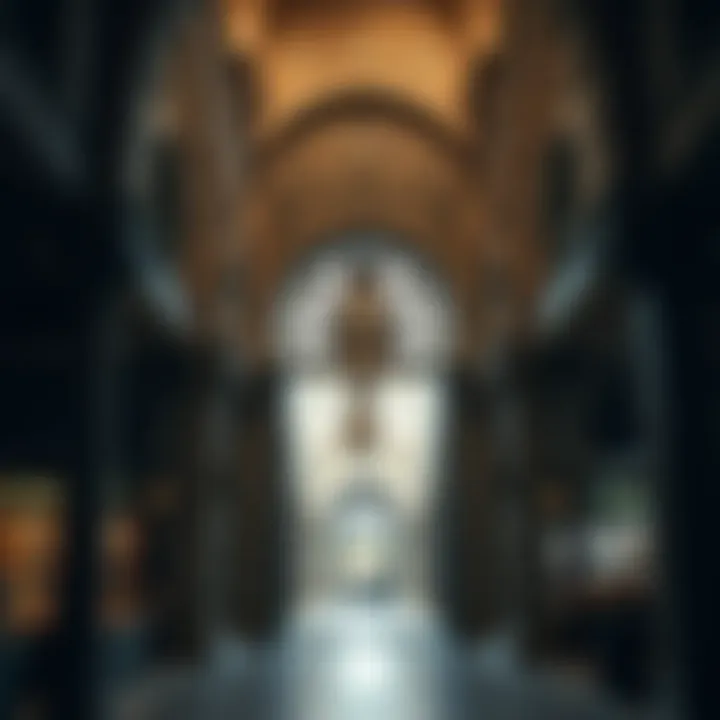
The Gold Souk, located in the heart of Dubai's commercial district, is arguably one of the most iconic markets in the city. With its shimmering displays of gold jewelry, it attracts and captivates visitors from all corners of the globe. This souk operates as a barometer of gold prices, reflecting fluctuations in the global market, thus serving as a vital resource for potential investors.
The allure of the Gold Souk lies not just in its vast selection—over 300 retailers—but also in the craftsmanship on display. Buyers often engage in bargaining, creating an interactive atmosphere where negotiations are part of the purchase process. The high purity of gold, commonly at 22 carats or above, assures buyers of quality. For those looking to invest, gold remains a stable asset that offers both aesthetic pleasure and fiscal prudence. As an investment, gold is perennial, and its value is enhanced through the artistry of local goldsmiths who create unique pieces that are only found here.
Spice Souk
The Spice Souk is a sensory wonderland that immerses visitors in the vibrant world of spices, herbs, and aromatic treasures. Located near the Dubai Creek, the souk is a testimony to the city's mercantile past, where diverse communities would exchange their goods. Walking through, one might catch glimpses of saffron, sumac, and a rainbow of spices, each inviting curiosity and culinary delight.
Beyond its role in local cuisine, the Spice Souk symbolizes cultural exchange. Visitors can find traditional herbs used in Emirati recipes as well as ingredients from distant lands—cardamom from India, cinnamon from Sri Lanka. For investors, particularly those in the food industry, understanding the dynamics of this souk can provide insights into emerging culinary trends. The Spice Souk not only contributes to local gastronomy but also enhances the tourism sector, drawing cultural enthusiasts eager to explore authentic flavors.
Textile Souk
The Textile Souk is a vibrant tapestry of colors and patterns, showcasing an array of fabrics, from silks to cottons. Nestled in the historic district of Bur Dubai, this souk gives a nod to an era of trade and craftsmanship. Local and expatriate tailors display their creations, inviting visitors to peruse bolts of fabric and rolls of traditional attire, such as the Emirati kandura and abaya.
For homeowners and design professionals, the Textile Souk provides an abundance of choices for home decor and fashion. It is here that unique textiles can be sourced directly, often at competitive prices. The potential to create bespoke clothing and remnant fabrics for home furnishings presents an intriguing opportunity for home decor investors. Understanding the textile industry roots in the region offers insight into quality and aesthetic trends that resonate within modern Dubai.
Perfume Souk
The Perfume Souk, with its intoxicating scents and charming shops, draws on Dubai's long-standing relationship with fragrance. Visitors can find everything from traditional oud and bakhoor to niche perfumes inspired by the desert and spice markets. Each bottle acts as a portal to the region's cultural history, showcasing the significance of scent in traditional ceremonies and day-to-day life.
Investors in the beauty and fragrance sector can find pearls in this souk. With a range of artisanal options, there lies a potential to incorporate these rich fragrances into modern cosmetic lines. Additionally, as sustainability becomes an increasingly crucial focus in the beauty industry, learning from the artisan approach of the Perfume Souk can foster a deeper connection with eco-conscious consumers.
Flea Market and Artisan Souks
The Flea Market and Artisan Souks embody the artistic spirit of local craftsmen and entrepreneurs. Each piece offers a story—handmade pottery, intricate metalwork, and vibrant art that reflects the cultural essence of Dubai. Tourists and locals alike enjoy browsing these markets, making it a hub for unique finds that you won't stumble upon in modern malls. These souks offer more than physical goods; they enhance the narrative of Dubai as a melting pot of cultures and creativity.
For real estate investors, these artisan markets present crucial networking opportunities. Engaging with local artisans can provide insight into ground-up community development, fostering friendships that bridge the gaps between modernity and tradition. Supporting creative economies contributes to a more well-rounded understanding of the market's fabric and adds depth to investment strategies.
Architectural Features of Souks
The architectural features of the souks in Dubai speak volumes about the rich cultural tapestry and economic vitality of the city. These traditional markets are not merely venues for commerce; they are vibrant spaces that reflect the history and heritage of the Emirati community. Understanding these features helps us appreciate their significance not just for shopping, but also for engaging with a living part of Dubai's identity.
Traditional Designs
Traditional souks in Dubai are often characterized by their unique architectural styles, which highlight local craftsmanship and materials. One common feature is the use of shading techniques such as the traditional wind tower (or "barjeel"), which serves a crucial function in cooling the space. Constructed from natural stone and materials, the wind towers capture breezes, providing ventilation in the often scorching summer months.
The narrow winding alleys encourage a sense of intimacy among visitors, contrasting the towering glass skyscrapers found elsewhere in the city. Clay and mud bricks are often utilized, showcasing an architectural style that is sustainable and closely attuned to the environment. This approach not only fosters a strong sense of place but also emphasizes the importance of community gathering spaces where social interactions flourish.
Additionally, ornamental features such as intricate wooden lattice screens (known as "mashrabiya") are commonly seen. These elements beautify the architecture while also providing privacy and shade, allowing for a comfortable shopping experience. In a bustling market like the Spice Souk, these designs create a sensory-rich environment, steeped in both charm and historical significance.
Modern Adaptations
As Dubai has rapidly evolved, the souks have not been left behind. There has been a noticeable shift towards incorporating modern elements into these traditional markets while still respecting their historical significance. Many souks have embraced contemporary design philosophies to enhance functionality and optimize visitor experience. For instance, the integration of modern lighting systems and digital signage has made navigation easier without overshadowing the original aesthetic.
Another significant adaptation involves improving accessibility for all visitors, including the installation of ramps and wider pathways. This is crucial in fostering an inclusive shopping environment, allowing everyone to engage with the rich culture and vibrant community atmosphere that souks promote.
Furthermore, some souks have enhanced their online presence, facilitating e-commerce opportunities for traditional artisans and vendors. This adaptation ensures that the fragile balance between the past and the future is maintained, allowing global audiences to participate in this unique shopping experience.
"The soul of Dubai's markets lies in their ability to meld the old with the new, crafting a narrative that attracts both tourists and locals."
In summary, the architectural features of Dubai's souks, while deeply rooted in tradition, have successfully adapted to modern demands. This dynamic blend not only preserves cultural heritage but also enhances economic opportunities, making them vital for investors looking at Dubai's property landscape.
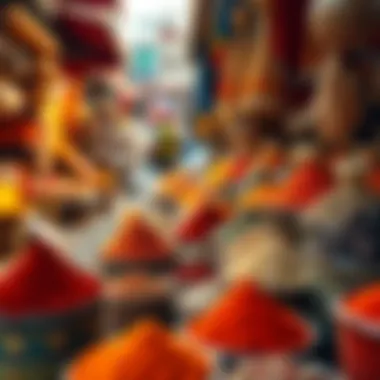
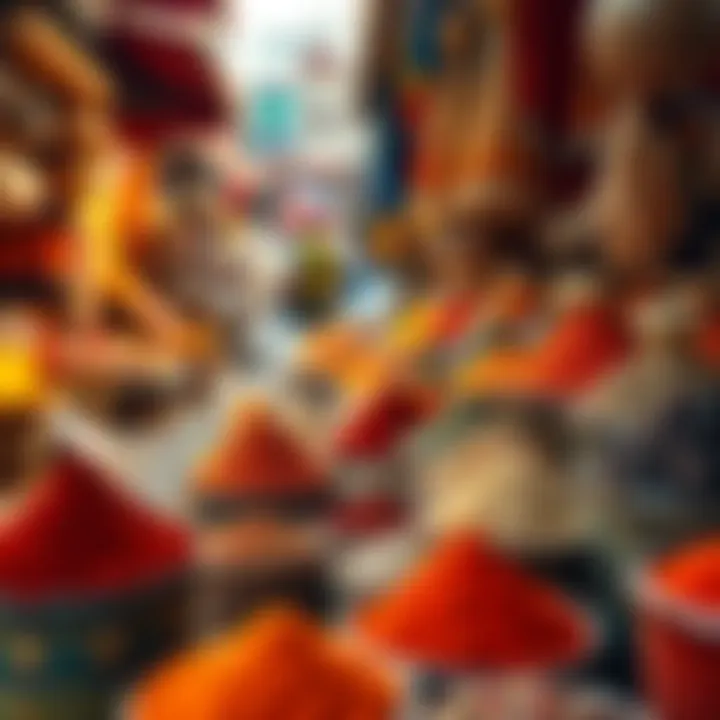
Economic Impact of Souks
The souks of Dubai aren’t just vibrant marketplaces; they are vital cogs in the economic machinery of the city. As traditional markets, they provide both cultural identity and financial benefits, playing a significant role in the growth of local businesses and the overall economy. Understanding this economic impact is essential for potential investors and stakeholders looking to navigate the intricate web of commerce in Dubai.
Contribution to Local Economy
The souks serve as an invaluable contributor to the local economy. They provide a platform for small and medium-sized enterprises, promoting entrepreneurship among the community. For example, a local merchant selling handmade rugs or intricately designed jewelry not only generates income for themselves but also creates jobs for artisans and craftsmen. This symbiotic relationship stimulates economic activity, ensuring that money circulates within the community.
- Job Creation: Many individuals find employment opportunities in these souks, from shopkeepers to skilled workers involved in crafting goods. This job market is often more accessible compared to larger corporations.
- Support for Small Businesses: Souks allow local artisans to display their creations without the substantial overhead costs inherent in operating a traditional storefront. As a result, unique and culturally significant products find their way to consumers, bridging the gap between tradition and modern commerce.
- Cultural Exchange: The influx of both local and international shoppers promotes a cultural dialogue that enhances tourism, ultimately benefiting Dubai’s position as a global city.
Tourism and Revenue Generation
Tourism is another significant driver of revenue generated through the souks. Visitors are not just attracted to the allure of unique goods; they are investing in an experience that connects them with Dubai's rich cultural tapestry. The Spice Souk, for instance, draws in tourists with its fragrant bazaars, while the Gold Souk mesmerizes with gleaming displays of jewelry.
- Attracting Tourists: The souks are often included in tours, showcasing their historical and cultural significance. Tourists flock to these venues to experience authentic local flavors, purchase souvenirs, and engage with the local community, which generates considerable income.
- Revenue from Sales: The sheer volume of sales made in these markets contributes directly to local governments through taxes and fees associated with business operations.
- Investment Opportunities: As tourism continues to grow, the potential for businesses operating in or near these areas expands. Investors looking for opportunities in hospitality, retail, or even real estate can find promising avenues for growth tied to the bustling activity of the souks.
"The true wealth of the souks lies not only in the products they sell but in the economy they help to sustain and grow."
The Shopping Experience in Souks
The allure of the souks in Dubai goes beyond mere transactions; it’s about the journey, the interactions, and the atmosphere that wraps around you like a warm shawl on a cool evening. For investors, homeowners, and anyone intrigued by the pulse of urban life, understanding the shopping experience in these traditional markets unveils critical insights into local culture and commerce. It’s a blend of excitement and education, making every visit an opportunity to connect with the community and the city’s heritage.
Bargaining Culture
In the souks, bargaining is not just an accepted practice, it is an art form. Engaging in this age-old tradition can seem daunting for first-timers, but it’s about more than just haggling over prices. It’s part of the social fabric that connects buyers and sellers, offering a dialogue that enriches the experience. Here, the interaction can often feel like a friendly dance, where both parties negotiate with smiles and a bit of playful banter.
For many, understanding how to bargain can be a deal-maker or breaker. Small tips can go a long way:
- Start low: Always initiate the bargaining with a price lower than what you're willing to pay.
- Be polite: A respectful attitude can foster goodwill, often resulting in a better deal.
- Walk away: Sometimes, showing disinterest can prompt the seller to offer a more attractive price just to keep you from leaving.
Bargaining is not just about saving money; it's about experiencing the vibe of the souk. In every conversation, you get a glimpse into the seller’s character and stories, making the shopping experience much richer than exchanging currency.
Unique Finds and Treasures
Exploring the souks is like embarking on a treasure hunt. Each stall and shop offer unique items that you simply won’t find in larger, more commercial retail spaces. From handcrafted jewelry to vibrant textiles, and intricate pottery, the treasures within these markets reflect the fusion of tradition and craftsmanship unique to Dubai.
Some things to keep an eye out for:
- Handmade artifacts: Each piece tells a story—whether it's a beautifully woven carpet or a hand-painted ceramic dish. These are not just products; they are collectibles that hold immense cultural significance.
- Locally sourced goods: The spice souk, for instance, offers an aroma of fresh spices that can transport you straight to the heart of Arabian cuisine. You can find saffron, sumac, and za'atar, each telling its own story of regional cuisine.
- Gold and gemstones: Especially in the Gold Souk, quality and design come together in dazzling displays that might leave you breathless. Here, it’s not uncommon to find bespoke pieces created right before your eyes.
Investors and real estate professionals particularly benefit from understanding these unique finds. They can unlock insights into consumer preferences and market trends. Whether one wants to appeal to tourists seeking authentic souvenirs or residents looking for quality handcrafted goods, a strong connection to local offerings is vital. In a world increasingly leaning towards mass production, the treasures in these souks underscore the importance of individuality and craftsmanship in the marketplace.
"The souks embody the spirit of Dubai—a place where tradition meets modernity, and every item has a narrative waiting to be discovered."
In essence, traversing the souks of Dubai provides an enriching dive into the cultural heritage and economic dynamics at play in the city. It's a space where each purchase symbolizes a valuable connection, making the shopping experience within these vibrant marketplaces unforgettable.
Challenges Facing Souks
The souks of Dubai, despite their cultural and economic significance, face numerous challenges that can impact their future. Exploring these challenges is crucial not only to understand the dynamics at play but also to gauge how these historical marketplaces can adapt in an ever-changing environment. The factors at play are deeply intertwined with modernization and market pressures, calling for a balanced approach to preserve the essence of these traditional hubs.
Competition from Modern Malls
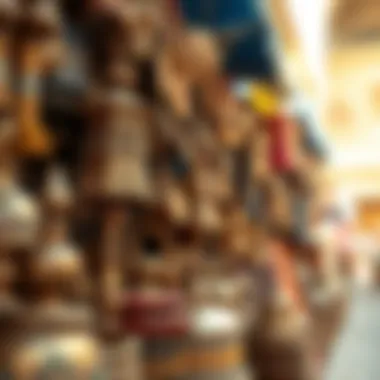
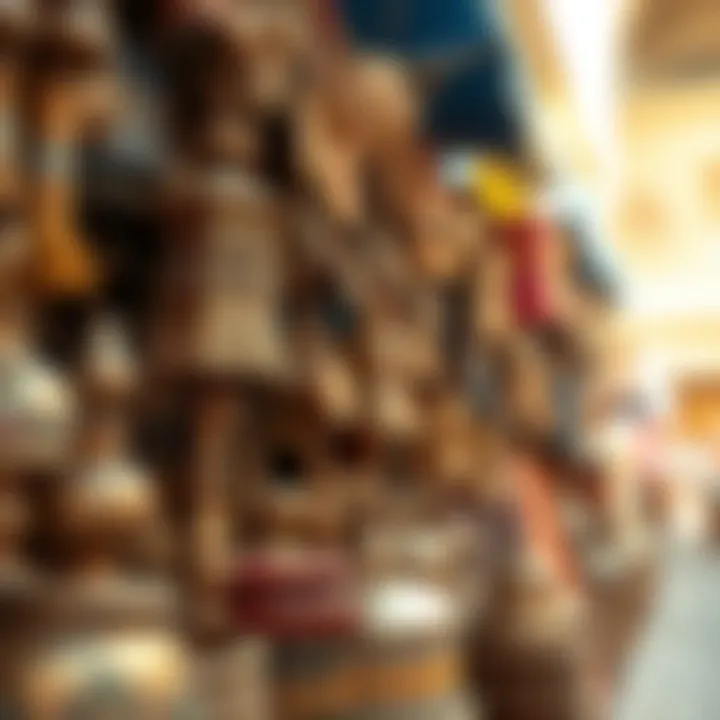
In recent years, the rise of modern malls has changed the shopping landscape dramatically. Malls like The Dubai Mall and Mall of the Emirates offer a plethora of high-end brands, extensive entertainment options, and air-conditioned comfort—attributes that draw in a considerable number of consumers.
- Convenience and Comfort: Malls provide a one-stop shopping experience that souks often lack. With sprawling spaces and climate-controlled environments, they cater to a lifestyle that increasingly prioritizes convenience over authenticity.
- Brand Recognition: Big-name retailers set up shop in these modern spaces, creating a desirability factor that smaller, traditional traders in souks find hard to compete against. A shopper might willingly spend more on a luxury product knowing it’s backed by a recognized brand.
- Family-Oriented Amenities: Malls also offer family-friendly environments with play areas, cinemas, and food courts, attracting families who may not find similar offerings in the bustling, more chaotic souk setting.
This competition creates a challenging atmosphere for souks, often leading traditional vendors to rethink their strategies, shifting focus to unique experiences that only they can offer. For instance, some souks have started to introduce live demonstrations or workshops, allowing customers to engage with the artisans and learn about their crafts.
Preservation Efforts
Amidst these challenges, there is a growing awareness of the need to preserve the cultural heritage embodied by Dubai's souks. These markets are not just places to shop; they represent the soul of the city and its history. Protecting this legacy involves various strategies and considerations:
- Government Initiatives: The Dubai government has acknowledged the significance of these souks and initiated various preservation efforts. Investment in infrastructure while maintaining the traditional aesthetic plays a crucial role.
- Community Engagement: Local communities are being involved in efforts to promote cultural events in these markets, such as festivals, art displays, and food fairs. This engagement ensures the souks remain vibrant and relevant to both locals and tourists.
- Adaptation to Modern Needs: Preserving the souks requires them to evolve, integrating modern technology and services without losing their charm. Some markets have started offering online shopping or express delivery services, catering to a younger audience accustomed to convenience.
"The preservation of our souks is essential not only for cultural heritage but also for the economy, as they attract tourists and promote local craftsmanship."
These efforts ultimately aim to strike a balance between modernization and tradition. By effectively addressing the threats posed by modern malls while fostering a distinct shopping experience, Dubai's souks can maintain their relevance and continue to thrive as cultural and economic hubs.
Future of Souks in Dubai
The future of souks in Dubai presents a fascinating intersection of tradition and modernity. As the city continues to evolve, these vibrant marketplaces face the challenge of maintaining their cultural significance while embracing new economic realities. It’s imperative to explore how these traditional markets can adapt to the shifting landscape without losing their essence. By examining sustainability initiatives and integration with real estate development, we can uncover the numerous benefits and considerations that lie ahead for the souks.
Sustainability Initiatives
Sustainability is not a buzzword anymore; it’s a critical component for any market, including the souks of Dubai. As the city grapples with rapid urban expansion and environmental concerns, souks are beginning to prioritize eco-friendly practices. The transition towards more sustainable operations can be seen in several initiatives:
- Waste Reduction: Many souks are adopting strategies to minimize waste. For instance, vendors are encouraged to use biodegradable materials for packaging, which promotes a cleaner environment.
- Local Sourcing: By prioritizing local products, souks can reduce their carbon footprint and support local artisans. This not only resonates with consumers who value sustainability but also fosters a sense of community.
- Green Spaces: Incorporating green spaces within or around the souk areas can create a more pleasant shopping experience while improving air quality. These spaces can serve as gathering spots for the community, enhancing social interactions.
Implementing these initiatives is essential, as they not only attract environmentally-conscious shoppers but also ensure that the souks remain relevant in an age that increasingly values sustainable living.
Integration with Real Estate Development
The relationship between souks and real estate development is a complex yet symbiotic one. As Dubai’s skyline transforms, the souks must strategically integrate with modern developments. This synergy can lead to numerous advantages:
- Increased Foot Traffic: Aligning souks with new commercial and residential developments can boost visitor numbers. When souks are easily accessible from contemporary shopping centers or residential complexes, they become more appealing to both locals and tourists.
- Cultural Heritage Promotion: New developments that incorporate the architecture and ethos of traditional souks can educate newcomers about the city’s rich history. This melding can create unique environments that celebrate both the past and the future.
- Enhanced Investment Potential: Areas combining modern real estate with traditional markets can attract higher investment. Investors are increasingly interested in developments that promise a blend of heritage and contemporary appeal.
The integration of souks with real estate projects is not just beneficial but necessary for the sustained relevance of these markets. It embodies the spirit of the city—where tradition meets innovation.
The overarching narrative is clear: for the souks of Dubai to thrive, they must remain anchored in their cultural roots while adapting to the demands of a rapidly changing world.
By focusing on sustainability and strategic integration with real estate, souks can retain their cultural significance while carving out a prosperous future in Dubai’s economic landscape.
Ending
In scrutinizing the myriad layers of Dubai's souks, this article provides a compelling narrative that intertwines history, culture, and economic dynamics. Understanding the significance of these markets is paramount for anyone interested in the intricacies of the region’s commercial and social fabric. Souks represent more than mere shopping venues; they are the beating heart of Dubai’s trade, encapsulating the essence of community and tradition, all while interfacing with modern demands.
Recap of Key Insights
- Cultural Heritage: The souks not only showcase traditional goods but also serve as focal points for cultural exchange. Each market, from the vibrant Gold Souk to the aromatic Spice Souk, presents unique attributes that reflect Dubai’s diverse heritage.
- Economic Impact: These traditional markets are vital players in the local economy, generating employment and invigorating tourism. They maintain a distinct identity against a backdrop of contemporary shopping malls, cementing their relevance.
- Investment Insights: For real estate investors, the proximity of souks can enhance property values, given the foot traffic and universal appeal of these areas. Understanding the potential of these markets is crucial for making informed property investments.
- Challenges and Opportunities: While modernization poses a threat to traditional souks, there’s an equally important conversation about sustainability and preservation. Efforts to maintain this cultural essence while adapting to tourist needs spotlight a path forward for this sector.
Importance for Real Estate Investors
For an investor, tapping into the vibrancy of the souks is akin to striking gold. They are more than historical sites; they are lucrative opportunities waiting to be explored. The interaction between buyers and local artisans can create foot traffic that uplifts nearby real estate values. Properties located near these bustling markets often enjoy a prime advantage, providing a stable source of income through rentals or sales.
Moreover, with increasing interest in sustainable development, investors committed to preserving Dubai’s heritage will find favorable prospects in supporting businesses that align with these values. Investing in areas adjacent to souks can position stakeholders advantageously for future economic growth as tourism continues to bloom.
"A wise investor knows that the past shapes the present, and in the souks of Dubai, every item tells a story." Investing in the future of Dubai's souks means not only capitalizing on their economic potential but also contributing to the preservation of a cultural narrative that is essential to the identity of the city.
Engaging with Dubai's souks paves the way for a return on investment that transcends mere financial gains, intertwining personal and historical narratives. This is the grand allure they hold, merging commerce with heritage.







